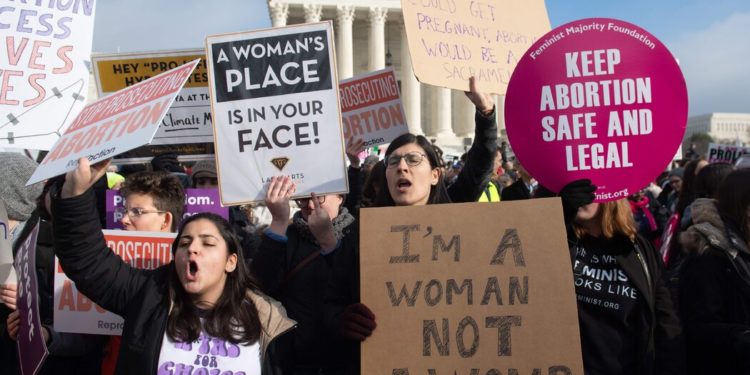Unlike other religious leaders, members of the Catholic clergy, as an all-male, celibate group, do not have wives or daughters to give them a sense of women’s experience. Yet their pervasive theology shapes policies that cause women untold suffering. It’s the basis for the hierarchy’s demand that a woman be forced to carry a pregnancy to term, even one that resulted from rape or one that threatens her life. It’s also the specter that makes women forgo hysterectomies because, we are told, it’s better to endure suffering than lose the possibility of giving birth. Women, in other words, are reduced to vessels, one in which the potential, theoretical life that might be is privileged over the living, breathing person at risk.
But Catholics should ask themselves whether the church’s anti-abortion fight is less about babies and more about controlling women’s fertility and, with that, women’s freedom. Bishops have notably little to say about methods to control male sexuality. They never turn vasectomies into a culture war issue. Though Catholic health care plans take pains to excise contraceptives from their coverage, treatments for male impotence are not prohibited, even though there is no certainty that men will use those drugs with their wives in order to procreate — the only kind of sex that the church condones.
Understanding the motivations behind these doctrines is important, even for the unchurched, because giving pregnant people the legal right to have control and agency over their bodies translates to other aspects of their lives, namely the capacity to claim political, economic and social autonomy.
Virulent anti-abortion rhetoric from on high has kept the majority of pro-choice Catholics silent — including the president of the United States. Now that the Supreme Court, with its six Catholic justices (five of whom espouse extremely conservative religious views), has decided to take up a case that is a direct challenge to Roe v. Wade, there has never been a more urgent moment to speak out boldly as people of faith who support the right to access abortion.
We must reject the silencing and stigma that church leaders use to seal off any questioning, dialogue or education around this issue. Catholics, in particular, must push through our conditioned discomfort. Members of a privileged, patriarchal caste of religious leaders are the only ones who benefit when we are afraid to say the word “abortion” in our affirmation of reproductive rights.
When my pathology report came back after my surgery, I discovered that my “perfectly healthy” uterus was in fact riddled with endometriosis and cysts. The initial tests the doctor conducted were unable to detect what I knew instinctively: A hysterectomy was a necessary and potentially lifesaving operation. My prayers were answered through medical intervention.
I’m grateful the pangs of religious guilt did not keep me from a procedure that has transformed my health and my quality of life. But I realized that if someone like me, who has made a career out of boldly proclaiming my dissent from church doctrines on sexuality and reproduction, can still be susceptible to its manipulations, who among us isn’t?
Jamie L. Manson is the president of Catholics for Choice and has a master’s in divinity.
Credit: Source link




